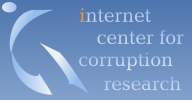
| Home → Lecture and Workshops → 2007 Passau |  |
|
The class of 2007 |
|
Time: October 7-13, 2007 Program: The program for the year 2007 is available here.
Guest Speakers
--> Mrs. Regina Puls, Head of Compliance at Deutsche Bahn AG (German Railways), on issues of corporate compliance and whistleblower programs. --> Mr. Martin Kreutner, Director of the Federal Bureau for Internal Affairs, Austria, on the prosecution tactics and strategies of the anti-corruption division in a specific corruption case. Abstract: Expectations versus real world scenarios in Anti-corruption investigations Expectations are normally high, but so is sometimes also disillusionment. In investigating corruption allegations one regularly has to stir in murky waters, one has to deal with the intelligent, with the most resourceful and the real powerful. The burden of proof lies with the investigators, and the investigational and judicial chain is only as strong as its weakest link. Even if the chain stays solid, one's day may end still missing the final but necessary piece of evidence in the corruptive mosaic. Subsequently, one is nolens volens instrumentalized in supposedly proofing the "innocence" of the corrupt. Too pessimistic a scenario? In his presentation Mr. Kreutner shall answer such questions and shall also present specific corruption cases. --> Mr. Kenan Tur, Managing Director of Business Keeper AG, Germany, together with Mrs. Maren Fink, Business Kepper AG, and Mr. Thomas Vennen, GTZ, on its whistleblowing system and its use in the fight against corruption. Abstract: Usage of an Electronic Ombudsman for the Protection of Whistleblowers Without a legal framework that protects whistleblowers, such protection can only be guaranteed through anonymity. Whistleblower information, however, must be able to be scrutinized. An anonymous dialogue conducted using the newest technical methods makes this possible, a method, which simultaneously allows investigators to make use of whistleblowers' insider information. As an electronic ombudsman, the BKMS® system is unique worldwide in its structural gathering of whistleblower information as an early warning system. The Internet based system sets the technical standard of protecting companies and administrations against risks caused by corruption and white-collar crime, as well as that of protecting whistleblowers who disclose such abuses with integrity. --> Mr. David Hawkes, Senior Institutional Integrity Officer and Regional Team Leader Africa, Department of Institutional Integrity at the World Bank, on "Transnational Corruption Investigations - Intelligence, Evidence, and Remote Detection Tools". Abstract: The World Bank's Department of Institutional Integrity (INT) is mandated to investigate allegations of fraud and corruption in World Bank Group operations. Within the framework of this mandate, INT has developed a set of cutting-edge tools to identify and prevent fraud and corruption in high-risk environments. Mr. Hawkes will introduce some of these instruments like the Voluntary Disclosure Program (VDP) and the Detailed Implementation Review (DIR). The presentation will also highlight the unique knowledge that INT has gained investigating fraud and corruption cases on the ground around the world. --> Mr. Dedo Geinitz, Development Economist and Director of GTZ UNCAC Project, together with Mrs. Dorothee Gottwald, Associate Expert, UNODC Crime Conventions Section (Guest), Mr. Georg Huber-Grabenwarter, International Law and Institution Specialist, and Mrs. Johanna Joerges, Political Scientists and Governance Expert, Mrs. Johanna Beate Wysluch, International Law and Convention Specialist, on "Asset Recovery - Taking the Profit out of Corruption Cases" Abstract: "The worst feeling is when our money is taken away form us. Criminals prefer to be put behind bars and keep their money than to stay free without it! Money is the main thing." These are the words of Gaspare Mutolo, a mafia don who collaborated with an Italian anti-mafia commission back in 1992. Asset recovery not only allows regaining stolen money but has a preventive effect by denying safe haven for the proceeds of crime. Asset recovery is one of the most complex projects in the field of law. It requires financial investigators tracing assets, forensic accountants unravelling complex transactions, attorneys skilled in multi-disciplinary and multi-jurisdictional litigation. The UN Convention against Corruption (UNCAC) addresses most of these challenges and provides a legal basis for asset recovery action. The workshop aims at providing an overview of an asset recovery operation in relation to the provisions of UNCAC. The participants will be engaged in contributing to solutions. --> Ms. Juanita Olaya, Transparency International, Germany, on corruption in public contracting. --> Mr. Gert Weidinger, Head of KPMG Forensic, and Patrick Kutschi, Project Manager, Austria, on corporate anti-fraud management and investigations. --> Ms. Sope Williams, University of Nottingham, on "Addressing Corruption in Public Procurement: Strategies and Initiatives". Abstract: Public procurement is an area in which bureaucratic corruption usually manifests. This is for various reasons such as the large sums of money involved, the non-commercial nature of government agencies and the nature of the relationship between public officials and the government. Because of the susceptibility of government contracts to corruption, many countries have introduced strategies to reduce the risk of this corruption and deal with it where it occurs. Some of these strategies are directed at public officials and others such as debarment and anti-corruption agreements are directed at contractors guilty of corruption. Many of the strategies directed at fighting corruption are problematic, and in some cases increase the risks of corruption. This session will consider a number of the more widespread measures against corruption in public procurement and the problems that attend the use of these measures. --> Mr. Frédéric Boehm, Berlin, on risks of regulatory capture and corruption in the regulation of infrastructure. --> Mr. Declan Hill, Oxford University, on corruption in sports events. |
||
| impressum | Innstr.27 - 94032 Passau - Germany - Fax: +49(0)851-509-2492 - last change 2008/02/12, 13:04. |